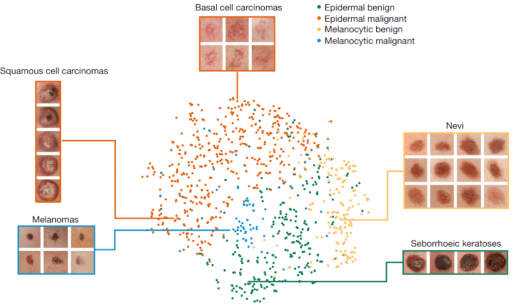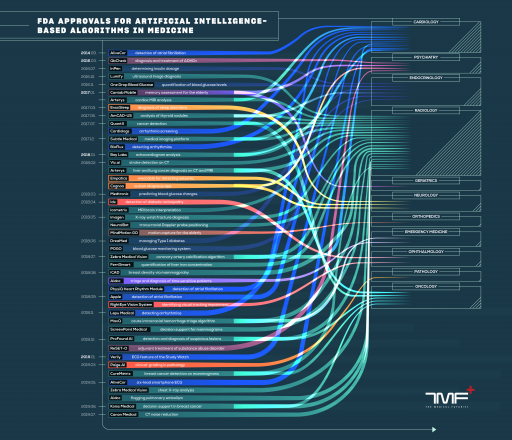FDA Approvals For Smart Algorithms In Medicine In One Giant Infographic
Mental health algorithms mimicking empathy? A.I. outsmarting human doctors? Simple big data analytical software presented with clever marketing tactics? It’s difficult to assess the actual state of play when it comes to artificial intelligence in healthcare. Moreover, there’s no database that contains all the smart algorithms worth applying to medical processes. That’s the reason why we decided to collect every artificial intelligence-based algorithm that already received FDA approval – meaning that they are proven, reliable, and accurate solutions enabled by an official regulator for medical use. Let’s see the infographic in details!
The factors of algorithmic healing
When we started to assess the universe of smart algorithms in healthcare, we took into account temporal and spatial factors, accuracy and credibility, as well as medical specialties where A.I. algorithms have a chance to make the care process better.
Concerning the timeline, we noticed an uptake in the appearance of new solutions in the last years, and you can see that also in the infographic. In 2014, only AliveCor’s algorithm for the detection of atrial fibrillation was approved. Two years later, the FDA found further four solutions ready for clinical use, while in 2017, six new algorithms were approved by the US regulator. This exponential growth just accelerated last year, when the FDA endorsed 23 algorithms in medicine. As the first approvals in 2019 also show, we do not expect the trend to slow down. On the contrary, we will most likely see dozens of new medical A.I. solutions on the market.
Looking at the spatial factors, while the most important hubs for A.I. development are the Silicon Valley, the Boston-New York area, Montréal, London, Bangalore, and Beijing, and the same can be applied in medicine and healthcare, the most decisive factor for compiling FDA approved algorithms was that it is the only yardstick for credible and accurate medical software. Although in Europe, the European Medicine Agency has guidelines and statements about artificial intelligence, the FDA is the only regulator with efficient instruments in its toolkit to access the credibility and accuracy of algorithms for medical purposes in detail. It also means that we had to stay on the U.S. market and consider the developments within the FDA’s jurisdiction.
What does an FDA approval mean?
Regarding the meaning of the FDA approval itself, the listed algorithms embrace the entire scale of approvals starting from 510(K) submission through de novo to premarket approval (PMA). The first one refers to a premarket submission to demonstrate that a device aiming for market launch but not requiring premarket approval is as safe and effective as other similar instruments with PMA. The latter actually means the FDA process of scientific and regulatory review to evaluate the safety and effectiveness of medical devices supporting and/or sustaining human life and the most stringent of the device marketing applications.
The de novo pathway for device marketing rights was added to address novel devices of low to moderate risk that do not have a valid predicate device – for example in the case of software solutions such as smart algorithms. Upon successful review of a de novo submission, FDA creates a classification for the instrument, a regulation if necessary, and identifies any special controls required for future premarket submissions of substantially equivalent devices. As the infographic would have been too complex if we had broken down the FDA approval into various subtypes, we left it as a single category for the time being.
Which medical specialties are the most algorithm-friendly?
When looking at the infographic itself, the distribution of smart algorithms in the various medical specialties becomes visible. Radiology and cardiology seem to be heavily populated by artificial intelligence-based solutions, there are already seven approved algorithms in cardiology, while 16 in radiology. However, geriatrics, orthopedics or pathology seem to be less prone to A.I. Certain medical specialties do not even appear in the list yet, such as pulmonology, dermatology, surgery, OB/Gyn or forensic medicine.
Although we should not draw definitive conclusions from only this infographic, as it constitutes a snapshot of the current state of play not revealing anything about the trends. For example, in the case of pathology, the number of FDA approved algorithms might be low at the moment, artificial intelligence is a promising technology in the field – although it might need the coming years to catch up with the number of solutions in radiology or cardiology.
These two fields represent the peak areas of artificial intelligence research due to several reasons. First and foremost, computer vision is one of the fastest growing fields in A.I. development, and medical imaging has both the data and the visuality that smart algorithms need to thrive. As a consequence, researchers found that commercial software for automatically classifying breast density, and thus detecting breast cancer, can perform on par with human radiologists. What’s more, in April 2018, the FDA approved the first AI system that can be used for medical diagnosis without the input of a human clinician.
Without further ado, let’s see a rundown of the algorithms.
The list of FDA approved algorithms in medicine
Check out our infographic here in detail and see the list below. Click on it for the high resolution version.
- AliveCor supports the early detection of atrial fibrillation, developed an ECG analytics platform – just as PhysiQ Heart Rhythm Module, Apple, and Cardiologs – and a six-lead smartphone ECG.
- QbCheck helps with the diagnosis and treatment of ADHD.
- InPen tracks insulin dosage.
- One Drop Blood Glucose quantifies blood glucose levels and automatically sends the data to the paired app.
- Lumify offers ultrasound image diagnosis.
- Cantab Mobile acts as a tool for memory problem assessment for the elderly.
- EnsoSleep powers a tool for recognizing sleep disorders.
- AmCAD-US evaluates thyroid nodules and categorizes nodule characteristics.
- Lepu Medical and BioFlux detect arrhythmias.
- Subtle Medical offers a medical imaging platform.
- Bay Labs offers echocardiogram analysis.
- Viz.AI detects stroke on CT scans and helps clinicians win the race against time.
- Arterys’ algorithm is able to spot cancerous lesions in liver and lungs on CT and MR images.
- Empatica helps detec epileptic seizures.
- Cognoa’s algorithm built into an app helps diagnose autism in kids.
- Medtronic and POGO monitor and predict blood glucose changes.
- Idx autonomously detects diabetic retinopathy using retinal images.
- Icometrix helps neurologists interpret brain MR images.
- Imagen aids healthcare providers in identifying wrist fractures with similar accuracy as human radiologists.
- NeuralBot offers a solution for transcranial Doppler probe positioning.
- MindMotion Go advances its algorithm for motion capture for the elderly.
- Dreamed assists healthcare professionals in the management of Type 1 diabetes.
- Zebra Medical Vision detects, quantifies coronary artery calcification, and analyses chest X-rays.
- Aidoc is able to flag brain bleeding in head CT images and pulmonary embolism.
- iCAD classifies breast density and detects breast cancer as accurately as radiologists.
- ScreenPoint Medical assists radiologists with the reading of screening mammograms.
- Briefcase triages and diagnoses time-sensitive patients.
- RightEye Vision System tracks eye movements for identifying visual tracking impairment.
- MaxQ develops an acute intracranial hemorrhage triage algorithm.
- ProFound AI detects and diagnoses suspicious lesions.
- ReSET-O offers an adjuvant treatment of substance abuse disorder.
- Verily developed an ECG feature on the Study Watch.
- Paige.AI provides a clinical-grade algorithm in pathology.
- FerriSmart created a machine learning solution for the quantification of liver iron concentration.




Comments
Post a Comment